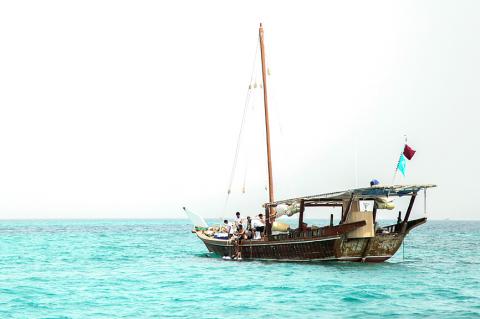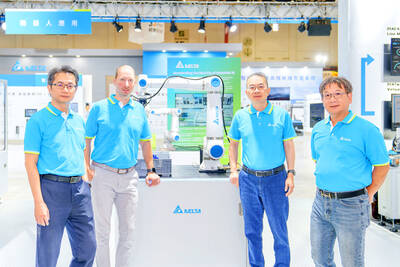From a distance, it could be a scene from Qatar’s ancient past, long before the country’s modern-day wealth was secured by the discovery of gas and oil.
Several kilometers off the coast of southern Qatar, five traditional dhows bob gently up and down on the becalmed blue-green waters of the Gulf.
On board each vessel are a number of gawas, or pearl divers.

Photo: AFP
In the midday heat, divers take it in turns to swim the 6m or so to the sea bottom unaided to find pearl oysters.
The strongest can stay underwater for about 90 seconds before returning, breathless, to the surface, hopefully with a net full of pearls, or lulus as they known in Arabic.
This is not some romanticized recreation of the past, but Qatar’s biggest annual pearl diving event, the “Senyar.”
And just like their pearl diving predecessors, today’s divers are there to try to secure a good bounty — a first prize of 400,000 Qatari riyals (US$110,000).
“There are four other boats,” says one of the competing captains, Mohamed bin Abdullah al-Sada.
“The total number of teams is five. There are two teams that we need to watch out for, but God willing we’ll finish ahead of them,” he adds.
However, this was not to be his year.
The scene may look like a picture postcard, but when you get closer, it is obvious this is a serious business.
The boats buzz with activity as the teams vie for the lucrative first prize.
Each team has up to five divers, all hurriedly shouting out instructions to the others so as to find the largest number of pearl oysters.
When a diver returns to the surface with a full bag, his teammates invariably cheer and shout out to the other boats, as the competition becomes fiercer by the hour.
Also on board is the boat’s skipper, who needs a deft touch to put the dhow in the right place for the divers and a thick skin to cope with the criticism when he does not.
There is also someone there to make sure the divers have enough food — chocolates and meats — and water, while a referee sits placidly over barrels crammed with pearls oysters ready to count.
The emphasis is on oysters rather than pearls.
To protect stocks, the oysters remain unopened.
However, collecting the most oysters is not enough to guarantee top spot. Teams are also awarded points for their treatment of the oysters.
“They decided that they should count the number of pearl oysters and not the pearls themselves because they believe that we should collect the oysters and then return them to the sea,” Sada says. “They said we should immerse them in water and then return them to their natural environment so that they live, breed and the place stays alive. So that they’re not impacted by the annual competition.”
One year, Sada admits, his team lost first prize because they did not follow the rules.
Fellow diver Abdullah Bilal says the motive for the competition is not only money, but “to keep Qatar’s heritage alive.”
“In the past, it had disappeared and we want to bring it back, especially the youth, who have energy and vigor,” he said.
Competition organizer Jehad al-Jaidah says the tournament appeals to Qatar’s historical reliance on the sea.
“Most of the Qatari people were born next to the sea. This was their way of life. Most of the Qataris went to the sea two or three times a week,” he said.
Pearl diving was one of the major industries in Qatar stretching from ancient times until the 1950s, but, Jaidah says matter-of-factly, “when the oil came, diving stopped.”
Jaidah does not romanticize the past and speaks realistically about the hardships endured by traditional pearl divers.
They spent months away from home at sea — the oyster catching season ran from May to at least August — surviving on rations and risking their lives to get enough pearls to ensure their families had money for the winter.
“It was a very hard life,” Jaidah says.
However, as modern as Qatar is now, with its gleaming glass-fronted skyscrapers, it cannot entirely break with the past.
Merchants known as Tawash traditionally supplied divers with food while they were at sea.
One of those Tawash was a member of the now-powerful Alfardan family, which nowadays trades not in food for divers and fishermen, but in luxury cars, yachts and jewelry beloved by deep-pocketed Qataris.

SETBACK: Apple’s India iPhone push has been disrupted after Foxconn recalled hundreds of Chinese engineers, amid Beijing’s attempts to curb tech transfers Apple Inc assembly partner Hon Hai Precision Industry Co (鴻海精密), also known internationally as Foxconn Technology Group (富士康科技集團), has recalled about 300 Chinese engineers from a factory in India, the latest setback for the iPhone maker’s push to rapidly expand in the country. The extraction of Chinese workers from the factory of Yuzhan Technology (India) Private Ltd, a Hon Hai component unit, in southern Tamil Nadu state, is the second such move in a few months. The company has started flying in Taiwanese engineers to replace staff leaving, people familiar with the matter said, asking not to be named, as the

The prices of gasoline and diesel at domestic fuel stations are to rise NT$0.1 and NT$0.4 per liter this week respectively, after international crude oil prices rose last week, CPC Corp, Taiwan (台灣中油) and Formosa Petrochemical Corp (台塑石化) announced yesterday. Effective today, gasoline prices at CPC and Formosa stations are to rise to NT$27.3, NT$28.8 and NT$30.8 per liter for 92, 95 and 98-octane unleaded gasoline respectively, the companies said in separate statements. The price of premium diesel is to rise to NT$26.2 per liter at CPC stations and NT$26 at Formosa pumps, they said. The announcements came after international crude oil prices

STABLE DEMAND: Delta supplies US clients in the aerospace, defense and machinery segments, and expects second-half sales to be similar to the first half Delta Electronics Inc (台達電) expects its US automation business to remain steady in the second half, with no signs of weakening client demand. With demand from US clients remaining solid, its performance in the second half is expected to be similar to that of the first half, Andy Liu (劉佳容), general manager of the company’s industrial automation business group, said on the sidelines of the Taiwan Automation Intelligence and Robot Show in Taipei on Wednesday. The company earlier reported that revenue from its automation business grew 7 percent year-on-year to NT$27.22 billion (US$889.98 million) in the first half, accounting for 11 percent

A German company is putting used electric vehicle batteries to new use by stacking them into fridge-size units that homes and businesses can use to store their excess solar and wind energy. This week, the company Voltfang — which means “catching volts” — opened its first industrial site in Aachen, Germany, near the Belgian and Dutch borders. With about 100 staff, Voltfang says it is the biggest facility of its kind in Europe in the budding sector of refurbishing lithium-ion batteries. Its CEO David Oudsandji hopes it would help Europe’s biggest economy ween itself off fossil fuels and increasingly rely on climate-friendly renewables. While